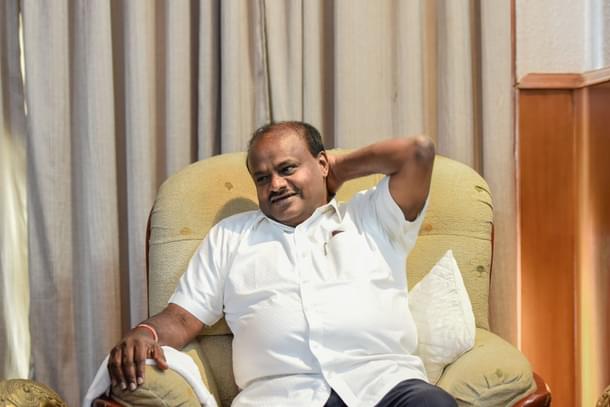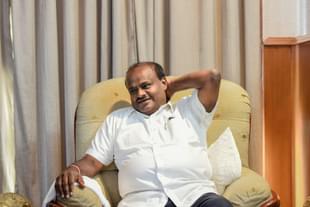Politics
Why #EmergencyInKarnataka Was Trending On Twitter
M Raghuram
May 06, 2019, 05:38 PM | Updated 05:38 PM IST
Save & read from anywhere!
Bookmark stories for easy access on any device or the Swarajya app.


The Janata Dal (Secular)-Congress government in Karnataka, during the last 10 days, arrested five persons who have been vocal against the regime and its policies, fuelling an uproar and questions on freedom of speech in the state.
Those arrested include Mahesh Vikram Hegde of Postcard fame, Ajit Shetty Heranje, Sharada, Prasanna Deshpande, Ravi Visinala Basavaraj and Ramesh Kuttappa of Kodagu.
These arrests were preceded by Chief Minister H D Kumaraswamy expressing his displeasure against the press publicly. When his father, H D Deve Gowda, and he were undergoing treatment in an ayurvedic spa in Kaup in Udupi district, the entire spa was fortified to keep journalists out.
Insider sources told Swarajya that Kumaraswamy has been under stress over reports relating to the elections in Mandya, Hassan and Tumakuru Lok Sabha segments. He is also reportedly upset with the media for critical articles in newspapers and web portals as well as panel discussions on television regarding them.
Arrests Made on Flimsy Grounds
A close associate of Mahesh Vikram Hegde, on condition of anonymity, said, “Mahesh was hounded by the police not in one case but in many cases. There were three attempts to arrest him in the last three months. All these cases were brought to the notice of the court by his legal counsel from time to time and not even once was the police successful in getting a legal arrest. But this time, they got him on a flimsy case.”
B V Seetharam, senior journalist and editor of Karavali Ale, an anti-establishment newspaper published from Mangaluru, wrote a front-page article against the arrests. He told Swarajya:
I do not consider the arrests of journalists an ordinary event. It carries widespread ramifications. After the coalition government came into force in Karnataka, there are 12 journalists who have been arrested in the same fashion. This is nothing but a show of fascist tendencies. If a journalist writes against the establishment, and if he is found to be committing a crime, there are methods to bring him to justice. They can file a case against him and get the court to adjudicate the matter. But misusing political power to arrest a journalist is wholly undemocratic and against the rules.
In the case of Ramesh Kuttappa and Santhosh Thimmaiah, both these journalists from Kodagu were arrested in midnight operations. A judge in Kuttappa’s case had pulled up the police for arresting him at midnight and producing him before the court at an unearthly hour. The judge is reported to have commented that the journalists were not terrorists and that they had not committed any crime for them to be treated in such a way. He is also said to have termed the incarceration of the journalists as “inexcusable”.
A journalist named S A Hemanth Kumar, was arrested by the CID in 2018 for sharing a letter which was deemed fake. He said that the letter was real and was written by a politician to the Chief Minister, about certain events that had occurred in the state. He said he had not written the letter himself but had just quoted it in his article.
“This did not amount to any crime as the letter did exist in reality and it was indeed written to people in high offices of the government. How did the police arrest him like he was a common criminal?” asks Naresh Shenoy, a functionary of the Yuva Brigade.
Even in other arrests like that of Ajit Heranje, the case was only that he had forwarded an article that had no offensive language or defamatory content, but was critical of a few state government programmes. Shruti Bellakki, another journalist who has also been arrested, had written on how the division between the Lingayats and the Veerashaivas would help the Congress and the JD(S).
Booked Under a Non-Existing Law
In the case of Sharada, the law department of the state has charged the journalist under Section 66(a) of the IT Act, which is now not in the statute book at all. Senior advocates observing this case are laughing at the government’s lack of knowledge, as it has chosen to frame Sharada under a non-existing law! Section 66(a) of the IT Act was struck down by the Supreme Court in 2015. Sharada has already got anticipatory bail.
JD(S Using Political Influence to Silence Journalists
The JD(S)-Congress combine is facing flak from the media as well as civil society for the way in which it is governing Karnataka. Caught between the need to retain political relevance and family interests, CM Kumaraswamy has been accused of using political influence to silence journalists.
Political observers in the Congress too state that even during the Siddaramaiah regime, journalists had written much against him and his son Dr Yathindra, and did not spare him when even his son passed away under mysterious circumstances in Europe. But he did nothing more than critically view the writings and panel discussions in both the print and visual media and brush them aside, they point out.
“Undeclared Emergency” in Karnataka
What is dangerous is that if this tendency of arresting journalists using police force is allowed to continue, it could send the wrong signal to MLAs, MPs or even zilla panchayat members who could use these incidents as a licence to stifle voices of dissent and critique.
In the backdrop of such events, Aravind Limbavali, former state minister and presently MLA from Mahadevapura in Bengaluru, tweeted that there was an “undeclared emergency” in Karnataka, following which many Twitter users likened the actions of the Kumaraswamy government to the socio-political climate prevalent in West Bengal under its Chief Minister Mamata Banerjee.
Raghuram hails from coastal Karnataka and writes on communal politics.





